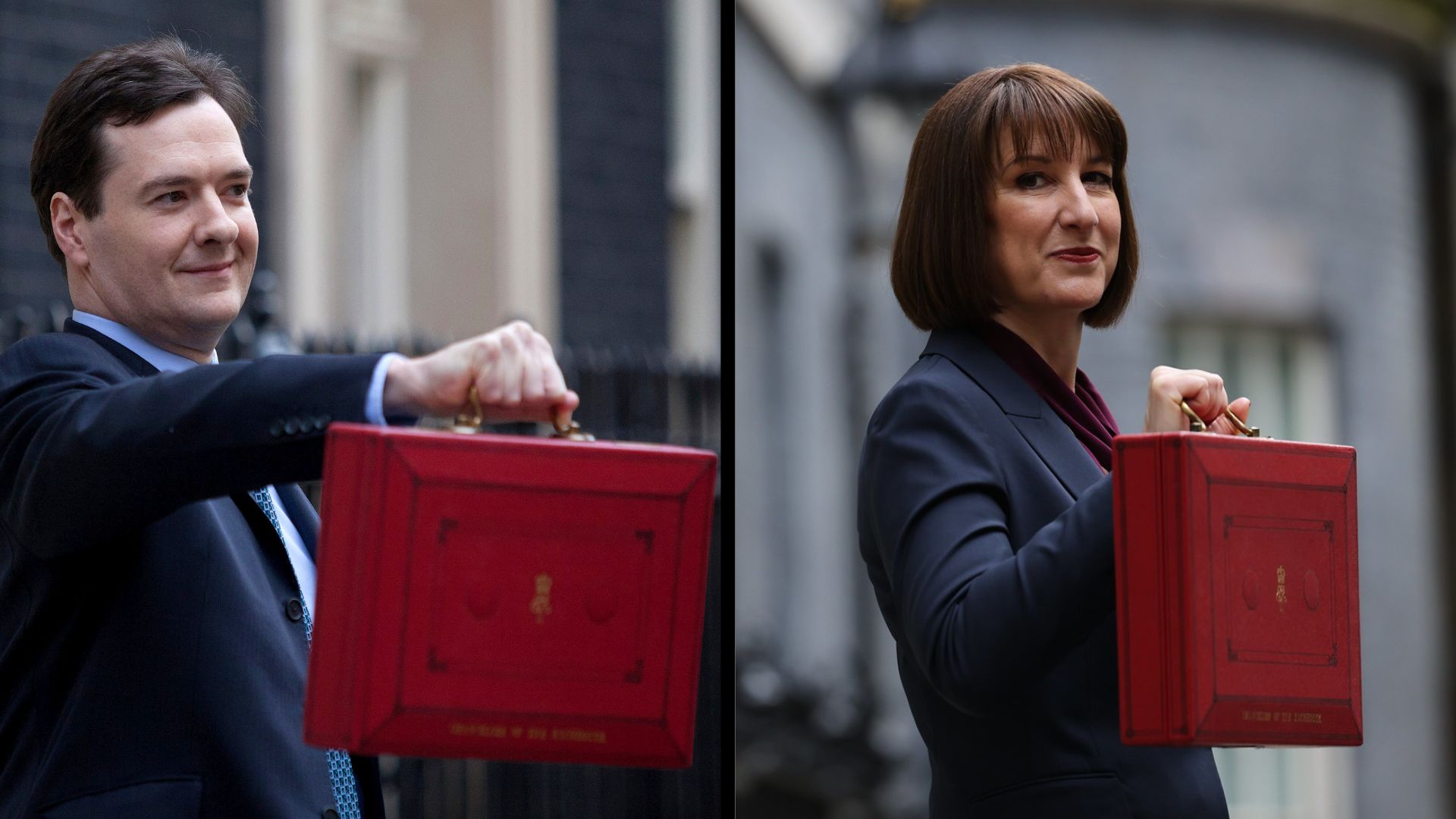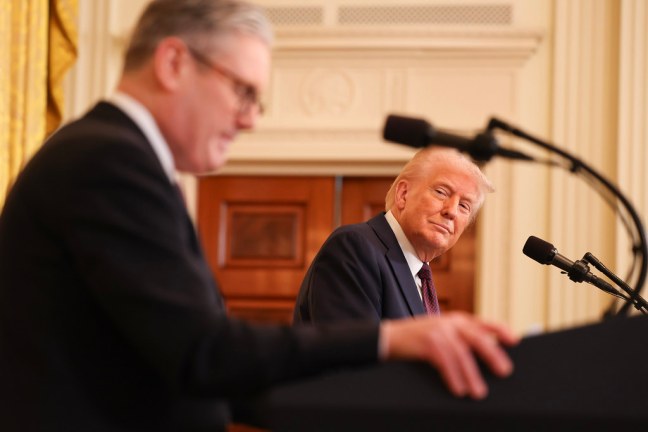A 0% inflation rate tends to be a “sign of a weak economy in trouble”, says Maudie Johnson-Hunter, an economist at the Joseph Rowntree Foundation. Low inflation means low growth and that has a ripple effect. Companies aren’t increasing prices, but they are also unlikely to increase wages.
“A decade ago, we had very low inflation for quite a long time in the UK, but that comes coupled with things like higher unemployment,” Johnson-Hunter adds.
The economy was stagnant, still struggling in the aftermath of the financial crisis, while the apparent good news of stable prices provided Osborne with “cover” for austerity measures.
Public services and benefits were slashed to save the government money – but this meant people were left with less protection from shocks like the recent cost of living crisis.
Pranesh Narayanan, an economist at the IPPR, says there was a flatlining of wages over 14 years of the Conservatives being in power, and that Labour is now struggling to balance the finances and drive growth as a consequence of that.
“All of these things are the outcome of low levels of economic growth in the previous decade, and the 0% inflation rate was one of the features of that period which indicated that the economy wasn’t growing very well,” Narayanan says.
Advertising helps fund Big Issue’s mission to end poverty
In 2025, we have a a stable-looking inflation rate – but does that mean we’re heading towards a thriving economy? Big Issue chatted to experts about what the government can learn from its predecessors’ mistakes.
‘We’re not going to start eating iPads’
Low inflation can relieve pressure on household budgets – but some prices will be going up and some going down, and it depends what prices are changing as to how much of an impact it will have on lives.
“You can imagine a situation where technology is getting cheaper but food is getting more expensive,” says Dominic Caddick, economist at the New Economics Foundation. “We’re not going to start eating iPads. It’s always a case of working out what is driving things.”
Cheaper food would make a “massive difference to people, because we would then be in a place where people are less reliant on food banks and essentials are taking up less of their budget, such that they can enjoy themselves, rather than just survive,” Caddick explains.
Poorer people are most affected by surging food prices as they tend to spend a greater share of family budgets on food (14%, compared to 9% for the highest-income households, according to the Resolution Foundation).
It is what has driven people to food banks in record numbers recently. Food price inflation reached 19.2% in March 2023, the highest rate in more than 45 years and nearly double the overall rate of inflation.
Advertising helps fund Big Issue’s mission to end poverty
Meanwhile, the social security system is failing to protect people from shocks like this, after years of real-term cuts and austerity measures.
‘Cover for austerity measures’
The inflation rate hitting 0% in 2015 “gave the coalition government a bit of cover for the austerity measures they were enacting”, says Alexander-Shaw.
“Inflation is a very unfavourable situation in which to try and do austerity. The fact that there wasn’t inflation 10 years ago was part of what made austerity measures possible. People were almost persuaded that it was the right thing to do.”
In September 2014, just before inflation reached record low levels, Osborne announced that if the Conservatives won the general election, he would introduce a benefits freeze as part of a £12bn welfare cut. It lasted four years.
This continues to impact people today. Universal credit falls short by around £120 monthly for people just to afford their essentials, according to the Joseph Rowntree Foundation.
Johnson-Hunter says: “We still see incredibly high levels of hardship amongst people on universal credit. When you fall on hard times, have a relationship breakdown, lose your job for whatever reason, you need the social security system to catch you.
Advertising helps fund Big Issue’s mission to end poverty
“But if it doesn’t pay enough money for you to be able to afford even the basics like food, heating, toiletries, that doesn’t help you to get back on your feet.”
Benefits are typically uprated in April by September’s rate of inflation, leaving a gap which means benefits will only be increased by 1.7% this year. Meanwhile, Labour is also pledging to slash the welfare bill. Economists warn that the UK cannot afford to return to austerity.
People might have faced a more stable price system 10 years ago, but their incomes were cut in real terms. Wages were stagnant. Benefits were frozen. Debts increased in value.
Central banks were buying bonds to push up prices and bring down interest rates. “That really only went to the richest, because that’s sort of the only way central banks can imagine intervening in the economy – by going through the financial markets,” Caddick says.
“But there’s so many theories about how central banks could have, for much less money than the hundreds of billions they gave to the banking sector, done stimulus with the economy, even targeted poorer people, and that could have been much more effective.”
It was a “unique moment of very low borrowing costs for governments” and they could have used that to invest in public services and rebuild the economy for the future.
Advertising helps fund Big Issue’s mission to end poverty
But “that wasn’t done because that government was ideologically opposed to public borrowing, and that now looks like a huge missed opportunity”, Alexander-Shaw says.
Does the Bank of England’s 2% inflation target work?
The risk of low inflation is that it will tip into deflation, meaning the economy is declining.
“In theory, the Bank of England is supposed to worry just as much about low inflation as they do high,” says Alexander-Shaw.
But some economists have doubts about the Bank of England’s 2% inflation target. Caddick says it tends to raise interest rates whenever inflation creeps above 2%, which can be harmful for people with debt.
“It kind of strangle-holds the economy and makes a recession more likely,” Caddick adds. “Central bank modelling suggests that if we raise interest rates, we’re going to cause unemployment. If you had a higher inflation target, central banks wouldn’t have to respond so aggressively.”
An alternative is being more flexible with the target, Caddick suggests, as inflation is not something banks can necessarily control because it is caused by external factors.
Advertising helps fund Big Issue’s mission to end poverty
What could Labour do to keep the economy stable?
The government doesn’t control inflation either, says Johnson-Hunter. “It’s their job to focus on getting the foundations of an economy right. If you enable families to participate fully in an economy, other parts of the market will begin to function much better.
“You will have things like external shocks, like we saw with the war in Ukraine, but it’s important that we build the resilience of families and of systems, so that people are well-placed to weather those storms and bounce back.”
She calls on the government to create a stronger social security system and public services so people can contribute to the economy, invest and spend.
Prices are unlikely to go down – and that would have repercussions for the economy – so the only real solution is income growth with higher wages and more generous benefits.
However, Narayanan points out that it is a “complicated picture” as wage growth sometimes gives businesses an excuse to put prices up, which can drive higher inflation.
“What we really need is a boost in productivity, and that’s really hard. If you have a boost in productivity, then you basically achieve sort of an improvement in growth, improvement in people’s pay packets, without a concurrent increase of prices,” he says.
Advertising helps fund Big Issue’s mission to end poverty
Narayanan suggests that Labour incentivises investors to put their money in technology, green transition and other areas which would maximise productivity in the UK.
Devika Dutt, lecturer in development economics at King’s College London, suggests “the only way to get out of this is to have a proper program of revival of investment and public services”. She claims Labour are trying to do this but the plans lack detail.
“There’s talk of further cuts, so it’s very hard to see that they’re not doing the same austerity measures because of short-term market fluctuations. I wouldn’t say it’s an economic crisis. It’s more of a political crisis. But what they should do is not repeat the past 20 years. Austerity does not work.”
Resilience in the UK has been eroded by austerity measures, and we felt that during the cost of living crisis. Caddick calls on Labour to be more ambitious.
“There are going to be lots of shocks every so often, related to climate, droughts, flooding, places where agriculture is going to become more scarce, and that’s going to raise pricing,” Caddick says.
“There’s also unfortunately lots more geopolitical conflicts, which can lead to energy prices going up, and there’s going to be more struggles for oil and gas with other countries implementing environmental regulations. We are also running out of reserves.
Advertising helps fund Big Issue’s mission to end poverty
“They have to realise that they can’t win from austerity. There won’t be a stable economy, and there won’t be good public services. They have to make sure they are telling a story that’s ambitious and makes a difference in people’s lives – and they have to start doing that as soon as possible.”
Do you have a story to tell or opinions to share about this? Get in touch and tell us more. Big Issue exists to give homeless and marginalised people the opportunity to earn an income. To support our work buy a copy of the magazine or get the app from the App Store or Google Play.










